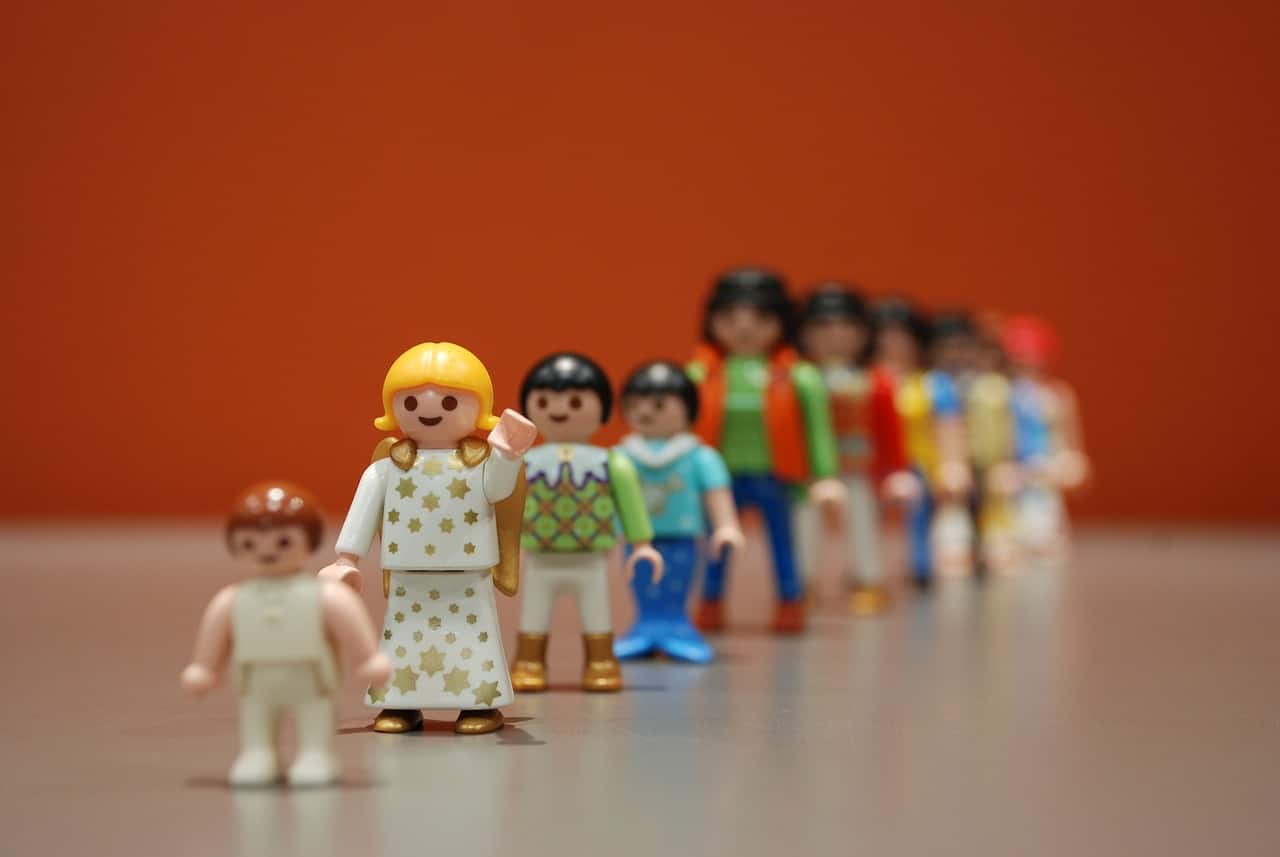
40+ French Descriptive Words and Adjectives
Language learning is just like cooking.
Think of nouns and verbs as the “meat” or primary parts of a sentence.
But without descriptive French adjectives, your sentences will come out dry and flavorless.
Read on to learn a variety of French descriptive words spanning various contexts.
We’ll talk about describing appearance, personality, emotions and more in French.
Contents
- How to Use French Adjectives
- French Physical Description
- French Personality Adjectives
- French Adjectives Describing Feelings
- Functional Descriptive Words
- French Words to Describe Order
- Where to Practice French Descriptive Words
- And one more thing...
Download: This blog post is available as a convenient and portable PDF that you can take anywhere. Click here to get a copy. (Download)
How to Use French Adjectives
Adjectives in French have the same use as adjectives in English. They function, in essence, as descriptive words. They modify a noun and provide extra information we wouldn’t otherwise have.
Here are a few things you’ll need to keep in mind about using French adjectives:
- Adjectives usually come after the noun. For instance: le vase rond (the round vase).
- The acronym BAGS can help you remember which adjectives go before the noun. These are adjectives related to beauty, age, goodness and size.
- Adjectives must agree in gender and plurality with the nouns they modify.
- There are irregular adjectives. These simply need to be memorized. We’ll point out below when an adjective’s feminine or masculine form deviates from the norm.
French Physical Description
Physical descriptive words characterize what a person, place or thing is literally like. These French adjectives describe what we can determine via our five senses.
Doux (m)/ douce (f) — soft, sweet
Son animal en peluche est si doux ! (His stuffed animal is so cute!)
Dur — hard
Laid — ugly
Joli — pretty
Ma femme est la plus jolie dans le monde ! (My wife is the prettiest in the world!)
Mince — skinny
On doit faire de l’exercice pour ne pas devenir gros. (One must exercise in order to not become fat.)
Mouillé — wet
Après une heure au soleil, mes vêtements sont encore mouillés ! (After an hour in the sun, my clothes are still wet!)
Droit — straight
Les enfants en maternelle apprennent à dessiner une ligne droite. (Children in kindergarten learn how to draw a straight line.)
Courbe — curved
Raidés — straight (describing hair)
Bouclés — curly (describing hair)
Nous avons tous les cheveux bouclés. (We all have curly hair.)
Note that we’re presenting raidés and bouclés in the plural because you normally won’t talk about a single strand of hair.
Foncé — dark
Clair — light
Leur nouvelle maison est bleue claire. (Their new house is light blue).
Add some color to your conversation! Don’t forget that colors are important descriptive words, too.
French Personality Adjectives
I’m sure you have a dazzling personality, but what good is it when you can’t brag a bit about it? Or how will you talk about that friend with a dynamite sense of humor? These words will help you communicate what someone is like.
Amical — friendly
Gentil (m)/ gentille (f) — nice, kind
Méchant — mean
Elle est si méchante. Elle refuse absolument de me parler. (She is so mean. She absolutely refuses to talk to me.)
Courageux (m)/ courageuse (f) — courageous, brave
Ceux qui ont caché les Juifs des Nazis pendant la deuxième guerre mondiale étaient vraiment courageux. (Those who hid Jews from the Nazis during World War II were really brave.)
Lâche — cowardly
Fort — strong
Faible — weak
Mon frère a un esprit faible. Il croit tout ce qu’on lui dit. (My brother has a weak mind. He believes everything one tells him.)
Assuré — confident
Timide — shy
Elle parle rarement en classe parce qu’elle est timide. (She rarely speaks in class because she is timid.)
Drôle — funny
Mon grand-père me racontait des histoires drôles de sa jeunesse. (My grandfather used to tell me funny stories about his youth.)
Ennuyeux (m)/ ennuyeuse (f) — boring
French Adjectives Describing Feelings
Whether you like to keep your deepest emotions inside or have everything out in the open, knowing how to discuss what you feel like (both physically and emotionally) will go a long way.
Malade — sick
Ma mère est malade avec la grippe. (My mom is sick with the flu.)
Sain — healthy
Heureux — happy
Malheureux — unhappy
Triste — sad
La chanson est si triste. Je pleure chaque fois que je l’écoute. (The song is so sad. I cry every time I listen to it.)
Fâché — angry
Content — pleased
J’étudiais toute la semaine, et maintenant je suis complètement contente avec ma note. (I studied all week long and now I am very pleased with my grade.)
Pressé — rushed
Nerveux (m)/ nerveuse (f) — nervous
Calme — calm
Vous devez rester calme ! Je suis sûre que tu vas trouver un bon travail. (You must remain calm! I am sure you will find a good job.)
Fatigué — tired
À cause de son cancer, mon oncle est souvent fatigué. (Because of his cancer, my uncle is often tired.)
Épuisé — exhausted
Functional Descriptive Words
Functional adjectives are used very often and play a key role in structuring sentences. The reason I call them “functional” is that they’re less concrete and more often serve a grammatical purpose rather than explicitly describing what something’s like.
You’ll get the idea as you look over this list.
Autre — other, different
Oui, je suis d’accord avec vous sur cette question, mais l’avortement est une autre chose. (Yes, I agree with you on that question, but abortion is a different matter.)
Certain — certain, different
Excusez-nous, nous cherchons un certain homme qui habite ici. (Excuse us, we are looking for a certain man who lives here.)
Tout — all
Chaque — each
Demain, chaque étudiant va partager leurs recherches avec la classe ! (Tomorrow, each student will share their research with the class!)
Même — same
J’ai la même chemise. (I have the same shirt.)
Pareil — same
Semblable — similar
French Words to Describe Order
French words that describe order (for instance, if you’re describing in what order a series of events took place) are considered adjectives. The good news is that, in this case, there’s a clear pattern. You don’t need to learn an entirely new word for each number!
These are just some quick guidelines to help you use “order words” in an orderly fashion.
The main irregulars are:
Premier (m)/ première (f) — first
Dernier (m)/ dernière (f) — last
Ce séjour est ma première fois en France. (This trip is my first time in France.)
The general rule to make a cardinal number (e.g. “three”) into an ordinal number (e.g. “third”) is to add the ending “-ième.”
Trois (three) → troisième (third)
Ils ont pris le train en troisième classe. (They rode the train in third class.)
Seconde (second) → deuxième (second)
Quatre (four) → quatrième (fourth)
Cinq (five) → cinquième (fifth)
Neuf (nine) → neuvième (ninth)
The abbreviations also follow predetermined rules:
Premier → 1er (masculine) and 1ère (feminine)
Seconde → 2nd (masculine) or 2nde (second)
No one wants to spell out a long number like 563rd in English, much less in French. When dealing with a large number such as this, simply write the numerals and add “-ème” (Parisian French) or “-e” (Quebec French). Thus, one would write either 563ème or 563e.
FluentU takes authentic videos—like music videos, movie trailers, news and inspiring talks—and turns them into personalized language learning lessons.
You can try FluentU for free for 2 weeks. Check out the website or download the iOS app or Android app.
P.S. Click here to take advantage of our current sale! (Expires at the end of this month.)
Where to Practice French Descriptive Words
Reading this article is a great start to boosting your French, but learning must always be put into practice in order to stick. These are some very practical ways you can take the next step:
- Tex’s French Grammar reviews adjective agreement and has a fill-in-the-blank exercise.
- If you’re ready for a bit more of a challenge, this Sporcle quiz has you type in the correct form of the adjective—and it features several irregulars!
- Whether in English or in French, using the same old adjectives over and over again makes for boring communication. Practice words you learn here and discover many more with Quizlet’s virtual flashcards. A couple of good places to start include this set and that set. Then, expand your repertoire even further with advanced French adjectives.
Whew! So much to keep in mind! And yes, this is only a sampling of the hundreds of rich words (adjectives and beyond) in French.
It truly is a wonderful language, one that only becomes more and more fascinating as you continue to expand your vocabulary and expression.
I hope that as you use these words you’ll fall more in love with the French language!
Download: This blog post is available as a convenient and portable PDF that you can take anywhere. Click here to get a copy. (Download)
And one more thing...
If you like learning French on your own time and from the comfort of your smart device, then I'd be remiss to not tell you about FluentU.
FluentU has a wide variety of great content, like interviews, documentary excerpts and web series, as you can see here:

FluentU brings native French videos with reach. With interactive captions, you can tap on any word to see an image, definition and useful examples.

For example, if you tap on the word "crois," you'll see this:

Practice and reinforce all the vocabulary you've learned in a given video with learn mode. Swipe left or right to see more examples for the word you’re learning, and play the mini-games found in our dynamic flashcards, like "fill in the blank."

All throughout, FluentU tracks the vocabulary that you’re learning and uses this information to give you a totally personalized experience. It gives you extra practice with difficult words—and reminds you when it’s time to review what you’ve learned.
Start using the FluentU website on your computer or tablet or, better yet, download the FluentU app from the iTunes or Google Play store. Click here to take advantage of our current sale! (Expires at the end of this month.)








